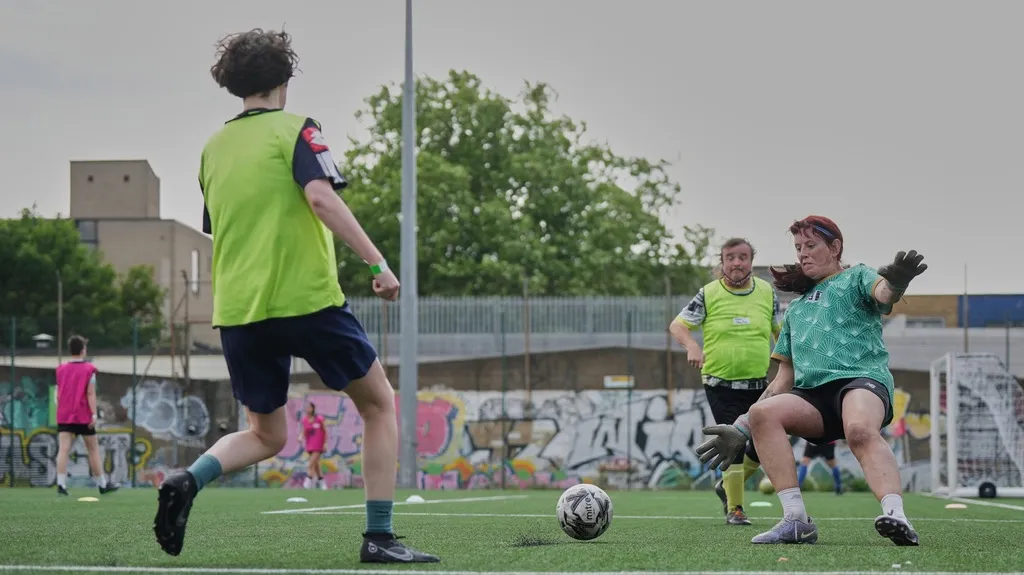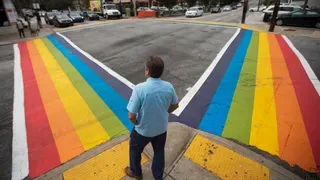November 29, 2013
The Tough Road for LGBT Asylum Seekers (Part 2)
Kevin Langson READ TIME: 5 MIN.
Editor's note: This is the second in a two part series that explores the trials and tribulations LGBT asylum seekers experience. You can check out part one here.
There is considerable hope in the mere existence of organizations such as the LGBT Asylum Support Task Force. Chair and co-founder Pastor Judy Hanlon says the organization raises $4,000 per month to house eight asylum seekers. According to Hanlon, the volunteer-run Massachusetts-based organization has assisted 65 people from 15 countries since 2007. They serve two major functions: the first is providing essentials, like housing, clothing and cellphones for corresponding with attorneys and family, to new arrivals in dire circumstances and educating the public.
The second, sharing the remarkable stories of the survivors who have been in their care, some of which can be found on the website of the LGBT Faith and Asylum Network, a consortium of organizations that serve LGBT and faith communities in some capacity which grew out of the Philadelphia Trans Health Conference in 2012.
In Austin there is a hearty network of agencies working together to provide a buffer for the masses of displaced that arrive here. Texas is one of four major destination states for newly arrived refugees (along with California, New York, and Florida) and is quite an interesting case in that, as a bright red border state, immigration is a contentious issue to say the least. At the same time, it has a capital city that is hip, progressive, and relatively navigable for those not vehicle-endowed.
Celia VanDeGraff, executive director of the Center of the Survivors of Torture, commented on the hostility and incredulity that many people express when she explains the work that she does -- as if it is somehow offensive to American values to funnel a bit of our wealth for the survival of some of the world's most vulnerable citizens. This stigmatization of refugees is unfortunately common, and JD of Refugee Services of Texas echoed this concern in his explanation that LGBT refugees risk double stigmatization, something RST struggles to avoid.
For example, they screen potential roommates carefully to avoid pairing LGBT clients with homophobic roommates; yet this often means that they are denied the comfort of living with someone of their own nationality or that they have to live on their own and are unable to share living costs. Despite good intentions, it is difficult for RST to efficiently serve LGBT clients because they get so few that there is no chance to establish a system for handling their cases. The relatively short time that they are under their care (roughly six months) means that there isn't really time to build rapport and trust.
The Center for Survivors of Torture (which co-presented "The Invisible Men," a documentary about a gay Palestinian man seeking asylum in Europe at Austin's LGBT film festival last year) provides much needed mental health services. Meanwhile, American Gateways exists to provide legal support for asylum seekers. Edna Yang, general counsel, explains that they mostly assist individuals who come up across the Mexican border, largely from Central American countries, but also some who have weathered a grueling boat trip from Uganda and other African countries.
When asked about needed policy change, Yang declared, without hesitation, "Stop detaining!" explaining that the detention centers compound trauma and criminalize those with no criminal records, a degrading process she feels disproportionately impacts queers.
Prejudice amongst immigration judges is also a considerable problem, with some judges exhibiting an abysmal eight percent approval rate, when the general approval rate of asylum claims is 43 percent.
She also explains that the vibrant network that exists in Austin is not a formal system but an improvised community of sorts created by organizations working together to meet needs. With better funding, the community could operate temporary homes that provide a dignified alternative to detention centers.
One such alternative exists in Casa Marianella, a brightly painted cluster of houses occupying one end of an otherwise quiet block in East Austin. This funky safe haven, decorated with murals and bustling with visitors, offers a safe residence for newly arrived asylum seekers while they sort out employment, more permanent housing and the legal process of asylum. They return here for mail, English classes, monthly parties, and hanging out. Social networks of transgender exiles form here and it is here where recent arrival, Edwin Martinez, currently resides.
Martinez explained his recent flight from Honduras; the regretful need to escape after his friend was drugged at a party, bludgeoned with a rock to the head and then dumped in the river before his sister was killed. After the incident, his family was threatened by a group of men due to his known homosexuality. Even though Martinez had his family's support, they both knew if he wanted to escape the deadly fate of his friend, then he needed leave his homeland. He detailed a harrowing journey in a rather subdued manner, which included the time he spent in the "freezer," a cold room without a bed in a detention center. He told EDGE he feels like "a bird freed from its cage."
Spending time at Casa Marianella has a way to make one appreciate the capacity of resourceful communities that empower the disenfranchised, such as Martinez. But for LGBTs there is the darker reality that even in welcoming spaces, anti-gay sentiment may rear its ugly head. The flipside is that we are a strong force that can prevent new Americans from falling between the cracks if we so choose. As Grungras points out, with the fall of the Defense of Marriage Act, we are looking good enough domestically that we can afford to shift our minds and hearts more to the plights of our brothers and sisters struggling overseas or finding their footing on our soil.




